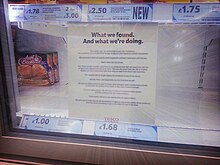
On 15 January 2013 it was reported that foods advertised in the European Union as containing beef were found to contain undeclared or improperly declared horse meat—as much as 100% of the meat content in some cases.[1] A smaller number of products also contained other undeclared meats, such as pork.[2] The issue was discovered through DNA testing on frozen beefburgers and lasagna sold in several Irish and British supermarkets.[3]
The analysis stated that 23 out of 27 samples of beef burgers also contained pig DNA. Adherents of some religions are forbidden from eating pork or horse meat due to their beliefs.[4]
While the presence of undeclared meat was not a health issue, the scandal revealed a major breakdown in the traceability of the food supply chain, and the risk that harmful ingredients could have been included as well. Sports horses, for example, could have entered the food supply chain, and with them the veterinary drug phenylbutazone, which is banned in food animals. The scandal later spread to 13 other European countries, and European authorities decided to find an EU-wide solution. They initiated meat testing of about 4,000 horse meat samples for the veterinary drug.
- ^ "Findus beef lasagne contained up to 100% horsemeat, FSA says". BBC News. 7 February 2013. Archived from the original on 7 February 2013. Retrieved 7 February 2013.
- ^ Cite error: The named reference
guardburgwas invoked but never defined (see the help page). - ^ "Horse meat scandal: timeline". The Daily Telegraph. Archived from the original on 21 September 2017. Retrieved 16 July 2017.
- ^ "Results of Burgers Analysed" (PDF). Food Safety Authority of Ireland. 22 January 2013. Archived (PDF) from the original on 23 January 2013. Retrieved 16 March 2013.